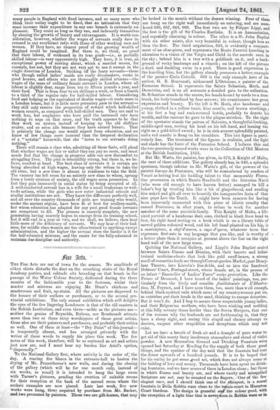SERVANTS' WAGES.
THE outcry about servants, which has been periodic for the last twenty years, is just now in full operation. If we may believe the all but unanimous voice of employers, the number of servants available is slowly declining, and their quality very rapidly deteriorat- ing. The causes assigned are as various as the temperaments of the speakers; but all agree as to the fact. According to ladies of the old school, it is education which has done all the mischief. Girls are educated above their position, and are impatient of servile work, of the incessant demands on their time, and of the almost equally incessant rebuke. It is all crinoline, say another class. Girls want to emulate their mistresses in dress, and prefer high wages, which they can spend as they like in adorning themselves, to less money and a respectable home. The rising generation, of course, follow their relatives' example, and so with the proportion of women to men yearly increasing, the supply of female servants yearly diminishes. Their quality, it is added, is far from improving. They are too valuable to be careful of their places, and too independent to be otherwise than lazy. They are fond of dress, over careful about food, make stipulations for leisure evenings, and are, above all, greedy of wages. Stories of absurd requests, of cooks leaving because they had "no time for French," and housemaids who correct their employers' geography, are circulated and exaggerated till the uni- versal body of middle class " missuses" seem .to apprehend a social dethronement.
One half of all this panic is, we believe, without any warrant at all, and the remainder is explained by causes very different from those assigned. It will be observed that the complaint is almost ex- clusively confined to female servants. Nobody asserts that butlers are in request, or that footmen are unattainable—no one moans over the scarcity of grooms, or suggests an importation of foreign gar- deners. There is, we believe, little difficulty felt by the class of employers to whom advertisements of " professional cooks," " skilled lady's-maids," and " upper housemaids," are addressed. Nor do the poorer grades of employers, those who keep and wish for only one servant, or who are accustomed to "put up" with foibles, greatly assist to swell the cry. It is the second and third rank of the middle class, the people who keep two servants, and want them to be at once orderly, thoroughly trained, and cheap, who make up the bulk of the complainants, and their cry in this, as in all other cases, is sure of an attentive hearing. They are perhaps by habit the most dependent of mankind, while the rigid ideas of order and decorum prevalent in England make the smallest offences seem unspeakably important. There are thousands of mistresses in London who would deem it almost a moral offence for a servant to be seen at a door without a cap, and exactness of this kind not only increases work but demands carefulness and completeness of training. It takes longer to teach a countrygirl to dress herself up to her employer's ideas, than to teach a soldier to keep himself clean, or his barrack-room in decent order. Year by year, therefore, the wives of this class finding applicants for places fewer and more exacting, and more slatternly where exactions are submitted to, declare that the breed of the "good old servants" is becoming altogether extinct.
Their opinion, however, though natural in the extreme, is, we believe, a mere delusion. Servants are just as numerous and just as good as ever they were, the only difference being that their wages have risen like those of most other trades. This is -the reason for the difference between the cry about men and women servants. The former are usually employed in houses where wages are not an im- portant item, and are engaged by the master, who knows how far their market value has really risen. The latter are employed by all classes, and engaged by the mistress, who cannot imagine why the ten pounds a year which once purchased a tidy serving maid now only tempts a slattern. The simple truth is that the qualified servant can get fifteen. For the past thirty years the wealth of England has been incessantly on the increase, and with the tone of living. Three times as many people can keep three servants, and, perhaps, five times as many try to do so. The demand exceeds the supply, while at the same time the cost of living has increased also. The servant has not to pay for her food, but she estimates her wages by comparison with the gains of those who have, and though dress is probably—finery notwithstanding—nearly as cheap as of old, still new sources of expenditure have been opened to servants as to everybody else. They move about more, which, besides enabling them to compare all wages with those current in London, actually costs money. Servants who live at a distance want to go home at least once a year, a trip which makes of itself, even with cheap excursion trains, a difference of ten per cent on their wages. Servants who once were content with the intelligence retailed from the parlour, now subscribe for newspapers and even books, to the infinite diminution of bad gossip. The new sources of expenditure, in fact, are endless, and arising as they have done simultaneously with the increase of demand, have produced very naturally a decided rise in wages. The employer who sticks to the old rates, which orderly families are very much inclined to do, finds naturally that every servant who applies has, therefore, "something against her," or is indifferently recommended, or is in- expert or half trained, and believes from the incessant recurrence of the same circumstances in all the households she knows, that some general law is in operation to deteriorate an entire class. There is such a law, but it is only that which deteriorates everything else, if the buyer sticks to one price in the face of a rising market. This explanation, we shall be told, is no consolation. There are so people in England with fixed incomes, and so many more who their outlay ought to be fixed, that an intimation that they must increase their expenditure in any one branch is extremely un- pleasant. They resist as long as they can, and indemnify themselves
by abusing the growth of luxury and extravagance. It is worth con- sideration, however, whether the wages of servants really have in-
creased in any exorbitant ratio with those of other working men and women. If they have, no clearer proof of the growing wealth of England could be imagined. But there is, we think, no proof
that their labour, if reckoned in its true grade—i.e., as partially skilled labour—is very oppressively high. They have, it is true, an exceptional power of moving about, which a married mason, for example, has not, but they are not very apt to use it except in the single direction of London. Striking off the fancy servants—those who though called ladies' maids are really dressmakers, cooks in good houses, and others who are thoroughly skilled artizans—the wages of the mass of ordinary female servants in London, where all labour is slightly dear,from ten to fifteen pounds a year, and their food. That is frornneur to six shillings a week, or from a fourth to a third of the regular rate for half-skilled labour. Considering food and lodging as the equivalent of double wages—it costs more in a London house, but it is little more pecuniary pips to the servant— they still only receive the proportion of reward which half-skilled women receive, as compared with half-skilled men. They are said to work less, but employers who have paid the increased rate have nothing to urge on that score, and the truth appears to be that they work on system instead of keeping up the old shiftless scurry, and so seem idle because they have earned leisure. That is precisely the change one would expect from education, and we know of few things more immoral than the frequent declaration of a "notable" housewife, that she "hates to see servants doing nothing." There will remain a class who, admitting all these facts, still plead that whether wages are fair or unfair they can pay no more, and must needs feel that the change in progress adds one new discomfort to struggling lives. The plea is irresistibly strong, but there is, we be- lieve, comfort at hand. The best class of servants it is certain are being absorbed at high wages, leaving only the refuse to take the old rates, but a sew class is almost in readiness to take the field. The vacancy has left room for an entirely new class to whom, sprung from a lower stratum of society, the old wages seem promotion. In fact they gain immensely in social status by being accepted at all. A well-conducted servant lass is a wife for a small tradesman or well- to-do artisan, while the girls who now enter industrial schools and similar institutions are not. They know the difference perfectly well, and all over the country thousands of girls are training who would, under the ancient regime, have been fit at best for scullery-maids, but whom education has adapted for any post good female servants are competent to fill. The process is scarcely complete, the new generation having scarcely begun to emerge from its training school, but it will end in a year or two, and we shall, we believe, then hear little more of the deficiency of servants. We may hear of their bad- ness, for middle class women are too often trained to apything except administration, and the higher the servant rises the harder is it for the half-educated mistress, and the easier for the fully-educated to maintain due discipline and authority.































 Previous page
Previous page